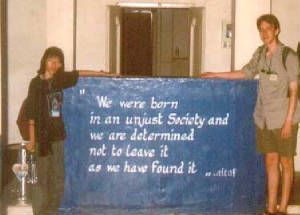I have some paradoxical beliefs in regard to religion: I support secularism, but at the same time I support religion. I am
aware of the ways that spiritual and religious stories can become manipulative, in justifying a political agenda, or in creating
political apathy. I believe religion is still very important, and not necessarily a reactionary force in society. Religion
enables both the handing on of culture through generations, and provides a ritualistic framework with which to engage with
the divine.
I understand that religion is often a barrier to culture being handed down- in that Christian missionaries still continue
to try to convert indigenous people to their religion. I support the actions of Hugo Chavez in banishing one big Christian
missionary group from the Venezuelan Amazon recently. Christianity's zeal to covert (sorry- convert) people makes it the most
imperialist religion.
However I still belong to that tradition. For me, the Judeo Christian Scriptures, interpreted through the prism of the Catholic
tradition provides the stories and images and rituals that stay with me- eg the image of the cross as a sign of redemption
through massive sacrifice...
I think that religious pluralism, and inter-religious dialogue, animates society a lot, and I think that any religious tradition
you are born into or otherwise can be an avenue to greater awareness. In many spiritualities, there are deep insights that
can be gained upon reflection. Paradoxes are one vehicle for this: eg you need to know emptiness in order to know wholeness.
Studying
poetry is in some ways equivalent. There is something very transformative about understanding the themes of a text.
Fundamentalism and Fear: An article I wrote in honi soit about students and opus dei- backed catholic groups.
Below is an extract from Starhawk's writing. Starhawk is a Pagan activist from the US, and I can really relate to her earth-based
spirituality:
Declaration of the Four Sacred Things
from the start of Starhawk's science-fiction book "The Fifth Sacred Thing" 1993
The earth is a living, conscious being. In company with cultures of many different times and places, we name these things
as sacred: air, fire, water and earth.
Whether we see them as the breath, energy, blood, and body of the Mother, or as the blessed gifts of a Creator, or as symbols
of the interconnected systems that sustain life, we know that nothing can live without them.
To call these things sacred is to say that they have a value beyond their usefulness for human ends, that they themselves
become the standards by which our acts, our economics, our laws, and our purposes must be judged. No one has the right
to appropriate them or profit from them at the expense of others. Any government that fails to protect them forfeits its legitimacy.
All people, all living things, are part of the earth life, and so are sacred. No one of us stands higher or lower than any
other. Only justice can assure balance: only ecological balance can sustain freedom. Only in freedom can that fifth sacred
thing we call spirit flourish in its full diversity.
To honour the sacred is to create conditions in which nourishment, sustenance, habitat, knowledge, freedom, and beauty can
thrive. To honour the sacred is to make love possible.
To this we dedicate our curiosity, our will, our courage, our silences, and our voices. To this we dedicate our lives.
New Internationalist currently has an edition on things carried out in the name of God, which is pretty interesting. The projection of religion
onto a fundamentalist political canvas is explored in this article: At war with the spirit of Islam from The Ecologist.
A recent article about the pope for vibewire.net
God is an asymptote

|
| At the "All-India Catholic University students Federation" IMCS Asia Pacific Conference-Chennai 2001 |
Fellowship of Reconciliation, USA
National Catholic Reporter, USA.
Iona Community, UK- This is a very interesting ecumenical Christian community, committed to nonviolence in a very deep way, that extends to
activism such as disarmament etc.
www.sabeel.org- Palestinian Liberation Theology
See the Wikipedia entry for Liberation Theology.
International Jesuit Network for Development

